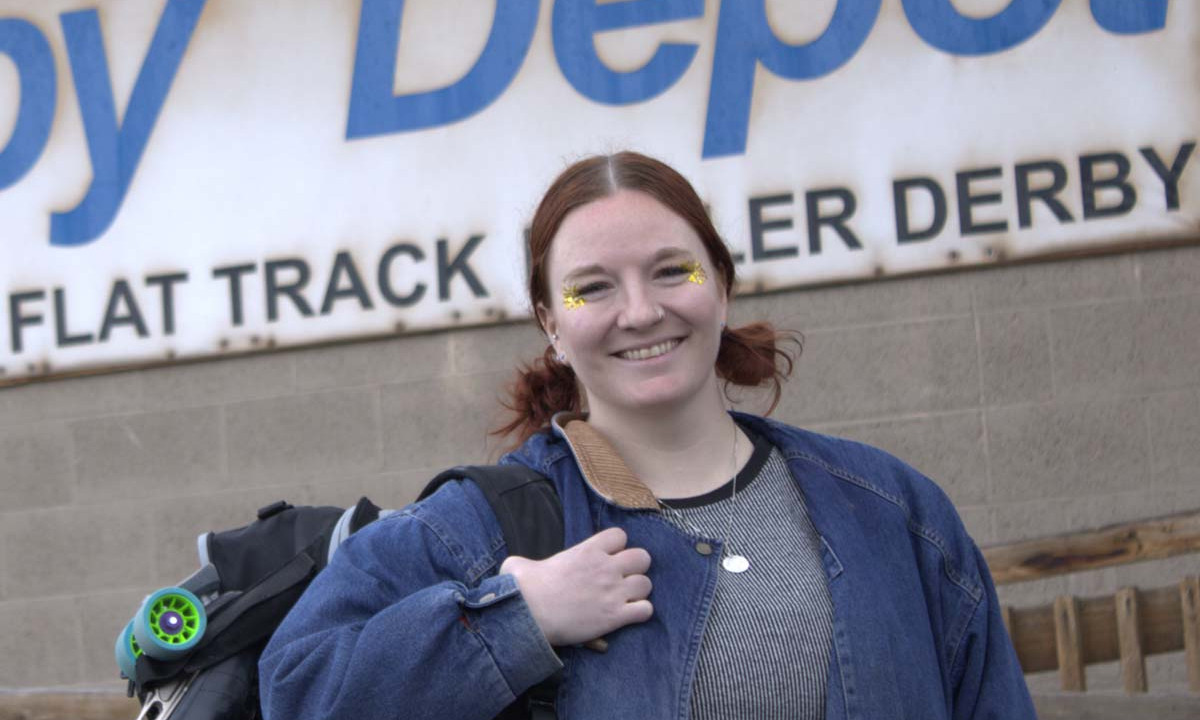This story is jointly published by nonprofits Amplify Utah and The Salt Lake Tribune to elevate diverse perspectives in local media through student journalism.
At Salt Lake City’s Derby Depot, where music ranges from fat P-Funk bass grooves to buzzsaw punk chords, a jammer glides smoothly around the bend.
In roller derby, jammers are the players who score points by successfully lapping a track and the opposing team’s gauntlet of defensive skaters, called blockers, who simultaneously clear paths for their own jammer. Most of the skaters in the sport are women, though an increasing number of men and nonbinary players from a spectrum of gender identities also play.
When jammers try to get past the blockers, the result usually is a wall of lunging limbs and hellacious hips.
One part of the wall is Brikel Weeks, aka Witch Slapped, a human battering ram who formerly outlasted addiction and, on that day in March, outlasted all other competitors at Uinta Roller Derby’s “Sur5al” special rules bout. She walked out of the building with her team, trophy in hand, with the words inscribed: “You didn't die. Congrats on surviving.”
Weeks said sometimes people ask her about competing with men.
“Like, ‘oh, is it scary to play?’” she said.
No, she said, it’s not.
“I'm way more afraid of like half the women I play against than the men,” she said.
Salt Lake City's roller derby scene has moved beyond the debates over alternative-identity classification and athlete participation that still trouble other leagues. Body checks don’t discriminate here. And if you want to join, that’s all the better, Weeks said.
“Roller derby is kind of ahead of the game.… We're already done talking about that,” she said.
The sport's countercultural roots continue to provide what many participants describe as a "safe haven" for those who might feel like misfits elsewhere — creating bonds that extend far beyond competition.
On Feb. 5, President Donald Trump signed an order designed to prohibit transgender women and girls from competing in women’s sports. While that order was aimed at high school and college sports, the panic about protecting the “sanctity” of women’s sports has echoed beyond academic institutions.
The people often missing from these discussions are athletes, like Weeks, who just don’t care who they’re competing against. And that includes many of the other players in this full-contact sport, who see things differently — starting with the value of their community.
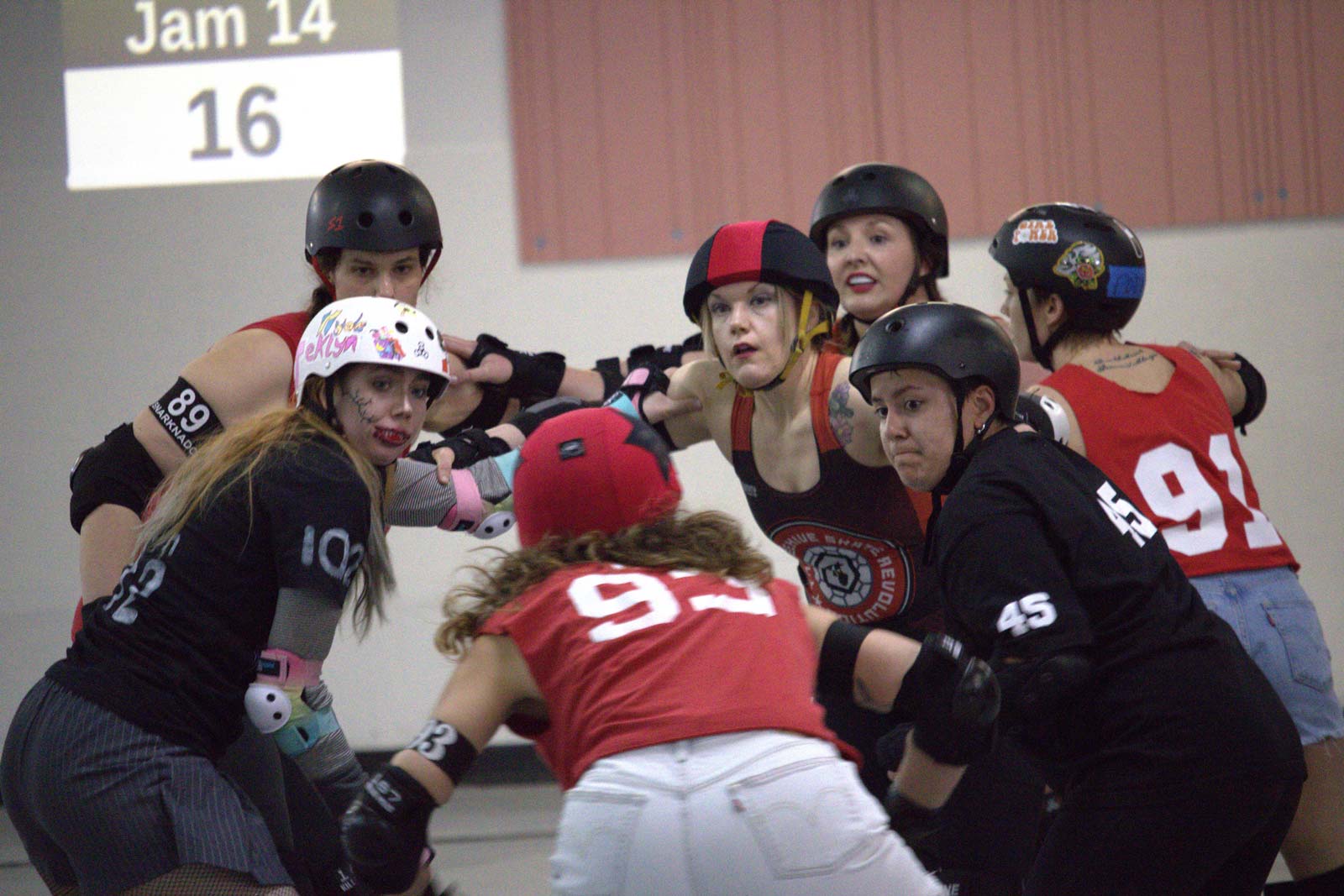 A jammer, center, decides how to skate past the opposing team’s defensive blockers. On March 22, the Beehive Skate Revolution held a “Twilight” movie-themed Team Edward vs. Team Jacob event for Salt Lake Roller Derby’s Crash Course program graduates. Photo by Frank Regalado
A jammer, center, decides how to skate past the opposing team’s defensive blockers. On March 22, the Beehive Skate Revolution held a “Twilight” movie-themed Team Edward vs. Team Jacob event for Salt Lake Roller Derby’s Crash Course program graduates. Photo by Frank Regalado
‘Derby soul saved my soul’
Weeks, 31, found roller derby fresh out of rehab 3½ years ago. She said people who come to the sport often don’t fit into regular culture.
“There's a really cheesy derby saying that's like, ‘Derby soul saved my soul,’” Weeks said. “We joke that we're a lot of outcasts, misfits or whatever.”
The punchline to that joke, she said, is that everyone who comes to roller derby finds community.
When she started her path to sobriety, Weeks said she stumbled upon Wasatch Roller Derby’s crash course program for new skaters. She found friends fast, and the support they provided has endured.
“Going from an addiction, which I think is one of the worst things you can do to your body, and then being able to be in a community that was accepting of the fact that I had a really long way to go,… everyone was very supportive of it,” Weeks said.
The community kept her going, she said.
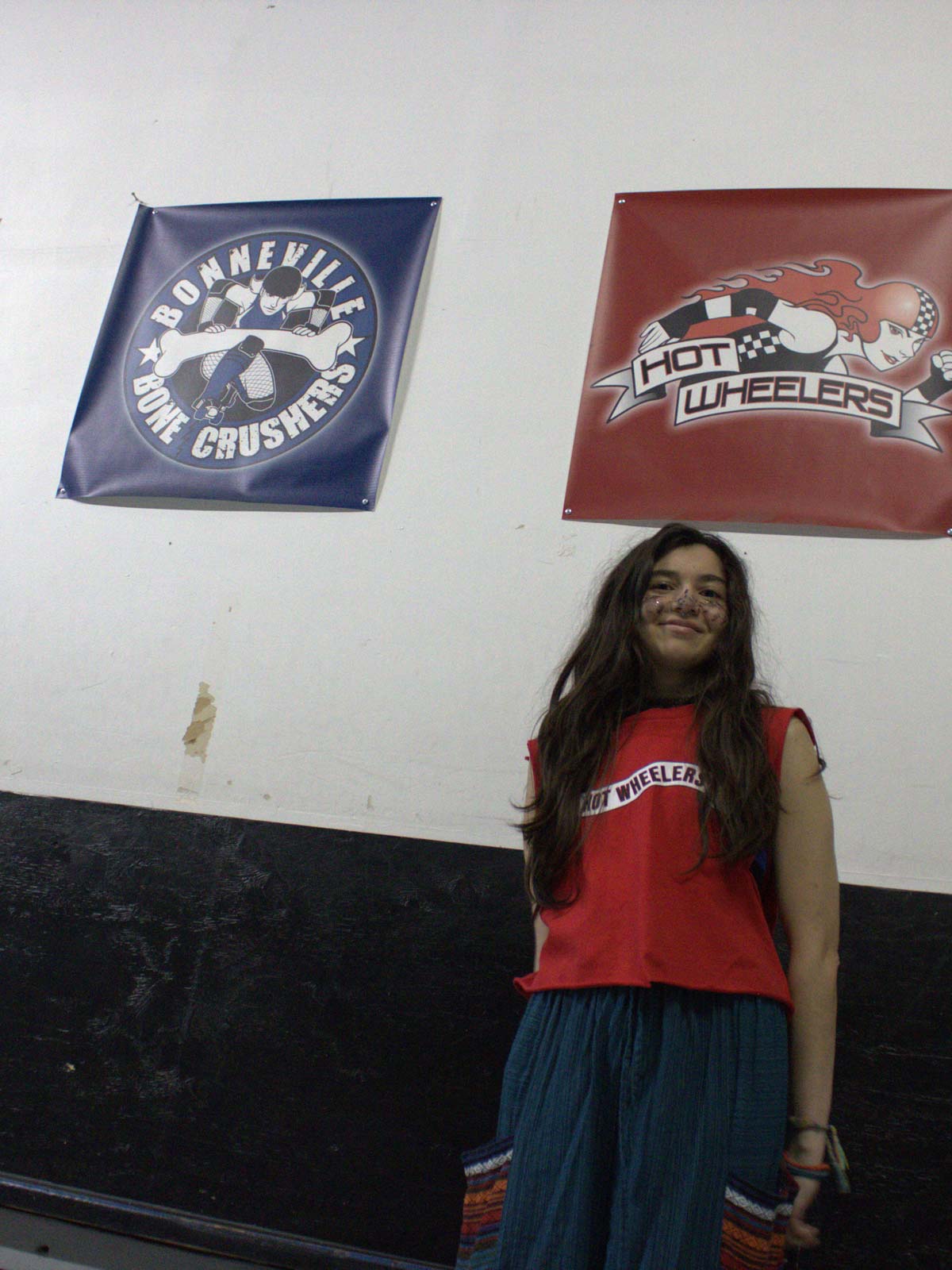 Hannah “Menstrual Psycho” Rivas stands underneath her team’s banner. Skating as a defensive/offensive blocker, she finds pride and satisfaction in being able to contain other skaters on the track. “Because this is not something you think you can do, especially when they're coming in hard and like with full intentions to take you out,” she said. Photo by Frank Regalado
Hannah “Menstrual Psycho” Rivas stands underneath her team’s banner. Skating as a defensive/offensive blocker, she finds pride and satisfaction in being able to contain other skaters on the track. “Because this is not something you think you can do, especially when they're coming in hard and like with full intentions to take you out,” she said. Photo by Frank Regalado
For Hannah Rivas, 24, whose derby alias is Menstrual Psycho, roller derby helped her find her voice.
“If you want to be heard, you have to scream on the track and make your presence known,” Rivas said.
The former volleyball player went from shyness to standing her ground, she added.
“If a big jammer is coming at me, I have to hold that jammer down,” she said. “It doesn't matter if they're a hundred pounds heavier than me, a hundred pounds lighter than me. I can still take them out.”
Rivas said it’s not just a community for alternative identities, which is a common misconception: Everyone can participate.
“We just want you to play. We just want you to feel welcomed,” she said.
And that makes for unique gameplay.
On the track
During Wasatch Roller Derby’s home season opener on March 8, Rivas, a blocker for the Hot Wheelers, linked arms in a defensive tripod to block an incoming jammer for the Disco Devils. The opposing forces clashed, revealing an entangled mess of different bodies laced with killer pads, tattoos and neon wheels.
Once the pain diffused, they hugged it out — then went back to hitting.
“People need to experience what they think isn’t right,” Rivas said of the prejudice against transgender athletes. “I don't think any of us have ever felt uncomfortable or weirded out or like, ‘Wait, we're playing with a trans person?’”
Mismatches on the track don’t matter either, she added.
“I'm 5-foot-1 and I know one of my friends who skates is 5-foot-1, too,” Rivas said, “and we take men out all the time. We take people bigger than us out all the time. Men, women, non-gender, it doesn't matter.”
Rivas said her greatest teammate was a man who was nearly 50 years old, and taught her everything he knew. Befriending him, Rivas said, dispelled any idea that men and women can’t play together.
“Every man that I've met at derby has been so kind and gentle,” she said. “The opposite of what you would anticipate a man being in a women-dominated game.”
If anything, Weeks said, there’s sometimes a level of toxicity and aggression that comes from cis-men who played in other sports. But they find out quickly that’s not how the derby community rolls. It's about respect among competitors.
“There's a level of competition, but people are not trying to hurt each other, and there's not blow-ups that you see in a lot of other sports,” she said.
Weeks said she has an aptitude for the strategy, tangle and tussle of roller derby. It’s not without a cost, though — she said she has endured a concussion and stress fractures in her feet from competition. Nonetheless, she enjoys the physicality of the sport, no matter what type of people are on the track.
“I feel like when I am done playing, I always feel proud of what my body can do. My strength, especially,” she said. “Playing all-gender roller derby, … my physicality and skill can still match up to someone who is maybe twice my size.”
Weeks grew up in a conservative small town. Boys played with boys, she said, and girls played with girls.
“Now it seems silly that I thought so many years ago that like, ‘Oh yeah, it should be so segregated,’ and that gender is this very finite construct, which I don't agree with now, especially since I've seen it in derby,” she said.
Size and strength are not the only things that make someone successful in sports, she added. The gender expansive policy in the Women's Flat Track Derby Association keeps the sport ahead of the game.
“I get that people are hesitant, but I also think that things that were uncomfortable 20 years ago, people [have] got to decide to get over it,” she said. “Because I think once you do, it's like, ‘Oh yeah, this isn't as scary as everyone made it sound like it was going to be.’”
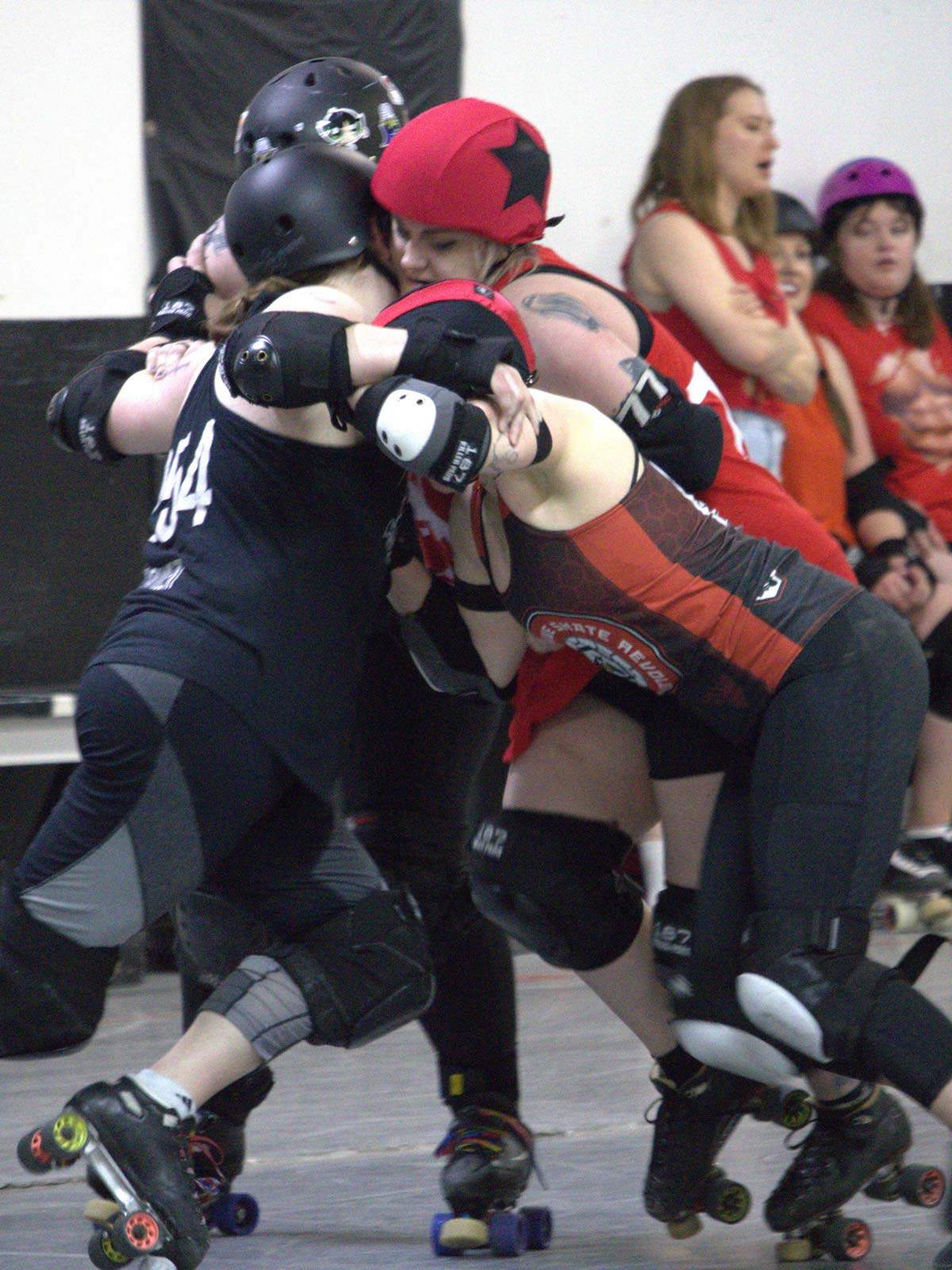 Derby skaters tussle to prevent the jammer, right, starred helmet, from making a pass. Many skaters enjoy the full contact aspect of roller derby. Photo by Frank Regalado
Derby skaters tussle to prevent the jammer, right, starred helmet, from making a pass. Many skaters enjoy the full contact aspect of roller derby. Photo by Frank Regalado
Proof of strength
As of last April, the state of Utah has grappled with 11 bills targeting alternative identities, according to the American Civil Liberties Union. With transgender people facing attacks, roller derby is steadfast in radical acceptance.
While pride flags are being removed from government and school buildings, the walls at the Depot are adorned with a varied range of colorful flags representing gender and sexual identities, as well as banners proclaiming human rights.
Neil Wade, aka Colin Deschottes — who has been an announcer, coach and referee for derby since 2007 — said that level of defiance is what makes the sport special in the current political climate.
“I feel like any group of people who are pushing for that and who are holding tight to it and want to protect it,” he said, “I want to be part of that.”
Holly Bishop, now a 10-year supporter after her daughter formerly competed in the juniors, runs “Derby Girl Creations” for fundraising assistance. Having witnessed children embrace the welcoming environment, she attests that derby creates transformation.
When kids who have alternative identities come to watch and participate in derby, “you could see this is maybe the only place in their lives where they felt like they could be accepted, be OK, and be safe,” Bishop said. “And I would watch those kids just really bloom and grow here. They felt something special when they came here. I love it.”
Both Weeks and Rivas acknowledged the current climate stokes fear and concern for the derby community, but they intend to persevere.
“It just makes us want to be that much more loud,” Weeks said. “Because we are a nonprofit hosting these events, we can display pride flags and that we can make sure that people know that trans skaters are in our community and they are safe in our community.”
Katie Buffington, a referee and athletics director for Wasatch Roller Derby, said it’s often people on the fringes and who feel downtrodden who organize derby, and they seek to build people up.
“Derby has thrown down a gauntlet when it comes to politics,” she said.
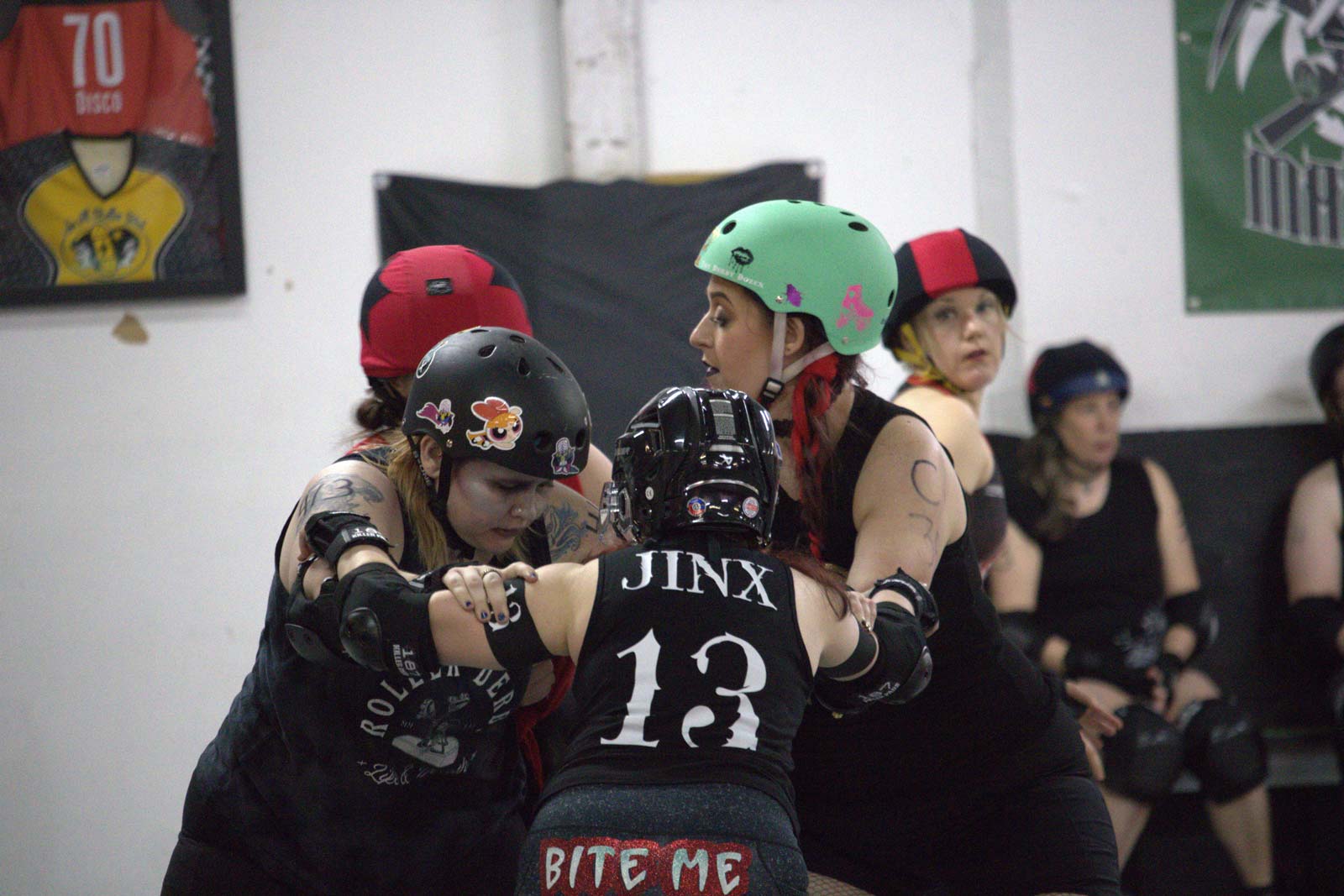 A jammer skates around the track after successfully lapping the opposing team’s defensive blockers. The Beehive Skate Revolution’s Team Edward vs. Team Jacob event, March 22, saw newly graduated skaters competing for the first time. Photo by Frank Regalado
A jammer skates around the track after successfully lapping the opposing team’s defensive blockers. The Beehive Skate Revolution’s Team Edward vs. Team Jacob event, March 22, saw newly graduated skaters competing for the first time. Photo by Frank Regalado
In New York, the Long Island Roller Rebels lost a bid to temporarily block a Nassau County law banning female trans athletes from participating in women’s sports at county facilities. The New York Civil Liberties Union filed an appeal on the Roller Rebels' behalf in March.
“We protect our own,” Buffington said. “Derby players won’t be intimidated by the unjust and hateful laws being passed. They help lead the charge to overthrow them.”
Rivas added that the Women’s Flat Track Derby Association, the international governing body for the sport, has been in talks of removing the term “women” from its name.
“We’re definitely noticing changes and we're trying to make derby a safe haven,” she said. “We want it to be a place where people can go and be themselves and not have to worry about being persecuted for who they are.”
Because of its openness and representation, those unfamiliar with roller derby lose sight that it is still a sport, Weeks said. She encourages those with preconceived ideas about roller derby and its athletes to check it out.
“If I can get people to come up and see what it is — people seem a lot more open to the sport, and the people in the sport, and they see why I love the sport,” she said. “It's actually a really cool community.”
Frank Regalado wrote this story as a journalism student at the University of Utah for a capstone course focused on women’s sports. It is published as part of a collaborative including nonprofits Amplify Utah and The Salt Lake Tribune.


